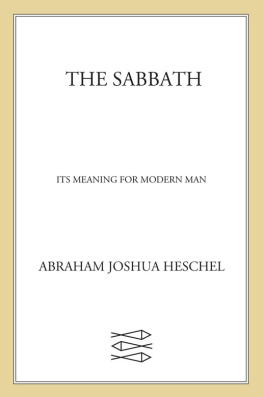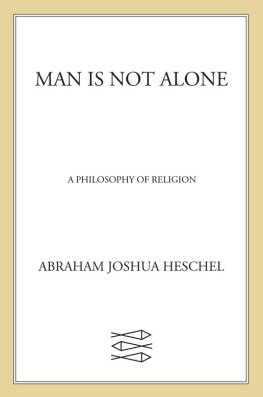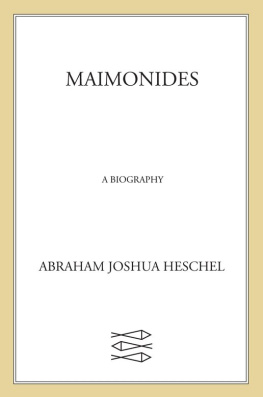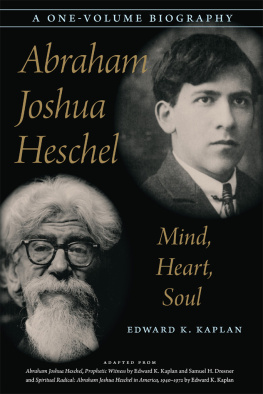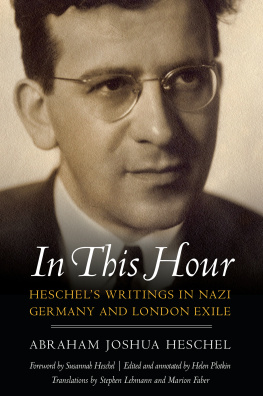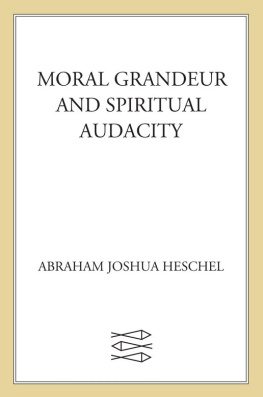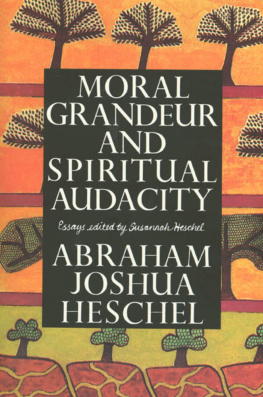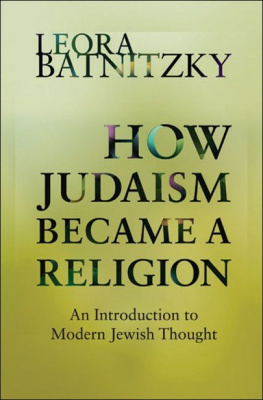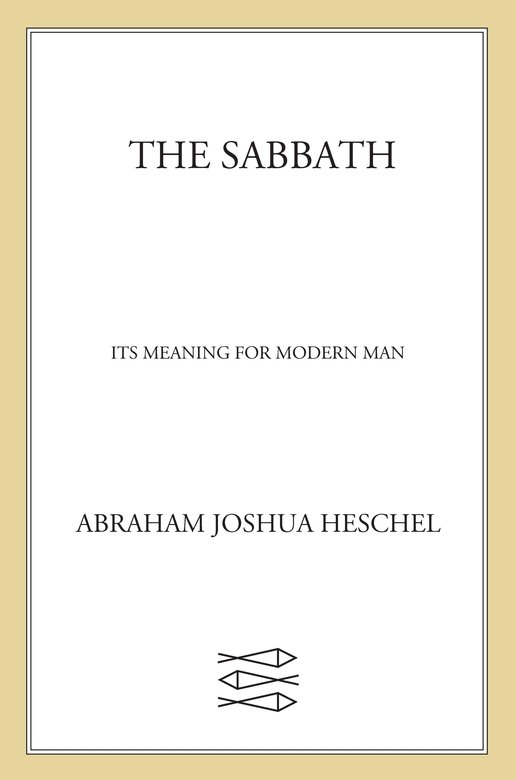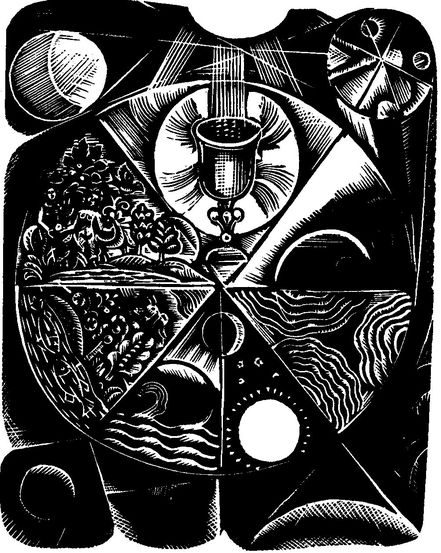To Sanctify Time
Pagans project their consciousness of God into a visible image or associate Him with a phenomenon in nature, with a thing of space. In the Ten Commandments, the Creator of the universe identifies Himself by an event in history, by an event in time, the liberation of the people from Egypt, and proclaims: Thou shalt not make unto thee any graven image or any likeness of any thing that is in heaven above, or that is in the earth, or that is in the water under the earth.
The most precious thing that has ever been on earth were the Two Tablets of stone which Moses received upon Mount Sinai; they were priceless beyond compare. He had gone up into the Mount to receive them; there he abode forty days and forty nights; he did neither eat bread nor drink water. And the Lord delivered unto him the Two Tablets of stone, and on them were written the Ten Commandments, the words which the Lord spoke with the people of Israel in the Mount out of the midst of fire. But when coming down the Mount at the end of forty days and forty nightsthe Two Tablets in his handsMoses saw the people dance around the Golden Calf, he cast the Tablets out of his hands and broke them before their eyes.
Every important cult-center of Egypt asserted its primacy by the dogma that it was the site of creation. In contrast, the book of Genesis speaks of thedays rather than of the site of creation. In the myths there is no reference to the time of creation, whereas the Bible speaks of the creation of space in time.
Everyone will admit that the Grand Canyon is more awe-inspiring than a trench. Everyone knows the difference between a worm and an eagle. But how many of us have a similar sense of discretion for the diversity of time? The historian Ranke claimed that every age is equally near to God. Yet Jewish tradition claims that there is a hierarchy of moments within time, that all ages are not alike. Man may pray to God equally at all places, but God does not speak to man equally at all times. At a certain moment, for example, the spirit of prophecy departed from Israel.
Time to us is a measuring device rather than a realm in which we abide. Our consciousness of it comes about when we begin to compare two events and to notice that one event is later than the other; when listening to a tune we realize that one note follows the other. Fundamental to the consciousness of time is the distinction between earlier and later.
But is time only a relation between events in time? Is there no meaning to the present moment, regardless of its relation to the past? Moreover, do we only know what is in time, merely events that have an impact on things of space? If nothing happened that is related to the world of space, would there be no time?
A special consciousness is required to recognize the ultimate significance of time. We all live it and are so close to being identical with it that we fail to notice it. The world of space surrounds our existence. It is but a part of living, the rest is time. Things are the shore, the voyage is in time.
Existence is never explicable through itself but only through time. When closing our eyes in moments of intellectualconcentration, we are able to have time without space, but we can never have space without time. To the spiritual eye space is frozen time, and all things are petrified events.
There are two points of view from which time can be sensed: from the point of view of space and from the point of view of spirit. Looking out of the window of a swiftly moving railroad car, we have the impression that the landscape is moving while we ourselves are sitting still. Similarly, when gazing at reality while our souls are carried away by spatial things, time appears to be in constant motion. However, when we learn to understand that it is the spatial things that are constantly running out, we realize that time is that which never expires, that it is the world of space which is rolling through the infinite expanse of time. Thus temporality may be defined as the relation of space to time.
The boundless continuous but vacuous entity which realistically is called space is not the ultimate form of reality. Our world is a world of space moving through timefrom the Beginning to the End of Days.
To the common mind the essence of time is evanescence, temporality. The truth, however, is that the fact of evanescence flashes upon our minds when poring over things of space. It is the world of space that communicates to us the sense for temporality. Time, that which is beyond and independent of space, is everlasting; it is the world of space which is perishing. Things perish within time; time itself does not change. We should not speak of the flow or passage of time but of the flow or passage of space through time. It is not time that dies; it is the human body which dies in time. Temporality is an attribute of the world of space, of things of space. Time which is beyond space is beyond the division in past, present and future.
Monuments of stone are destined to disappear; days of spirit never pass away. About the arrival of the people at Sinai we read in the Book of Exodus: In the third month after the children of Israel were gone forth out of the land of Egypt, on this day they came into the wilderness of Sinai (19:1). Here was an expression that puzzled the ancient rabbis: on this day? It should have been said: on that day. This can only mean that the day of giving the Torah can never become past; that day is this day, every day. The Torah, whenever we study it, must be to us as if it were given us today.
The worth of a great day is not measured by the space it occupies in the calendar. Exclaimed Rabbi Akiba: All of time is not as worthy as the day on which the Song of Songs was given to Israel, for all the songs are holy, but the Song of Songs is the holiest of holies.
In the realm of spirit, there is no difference between a second and a century, between an hour and an age. Rabbi Judah the Patriarch cried: There are those who gain eternity in a lifetime, others who gain it in one brief hour.
Technical civilization, we have said, is mans triumph over space. Yet time remains impervious. We can overcome distance but can neither recapture the past nor dig out the future. Man transcends space, and time transcends man.
Time is mans greatest challenge. We all take part in a procession through its realm which never comes to an end but are unable to gain a foothold in it. Its reality is apart and away from us. Space is exposed to our will; we may shape and change the things in space as we please. Time, however, is beyond our reach, beyond our power. It is both near and far, intrinsic to all experience and transcending all experience. It belongs exclusively to God.
Time, then, is otherness, a mystery that hovers above all categories. It is as if time and the mind were a world apart. Yet, it is only within time that there is fellowship and togetherness of all beings.

